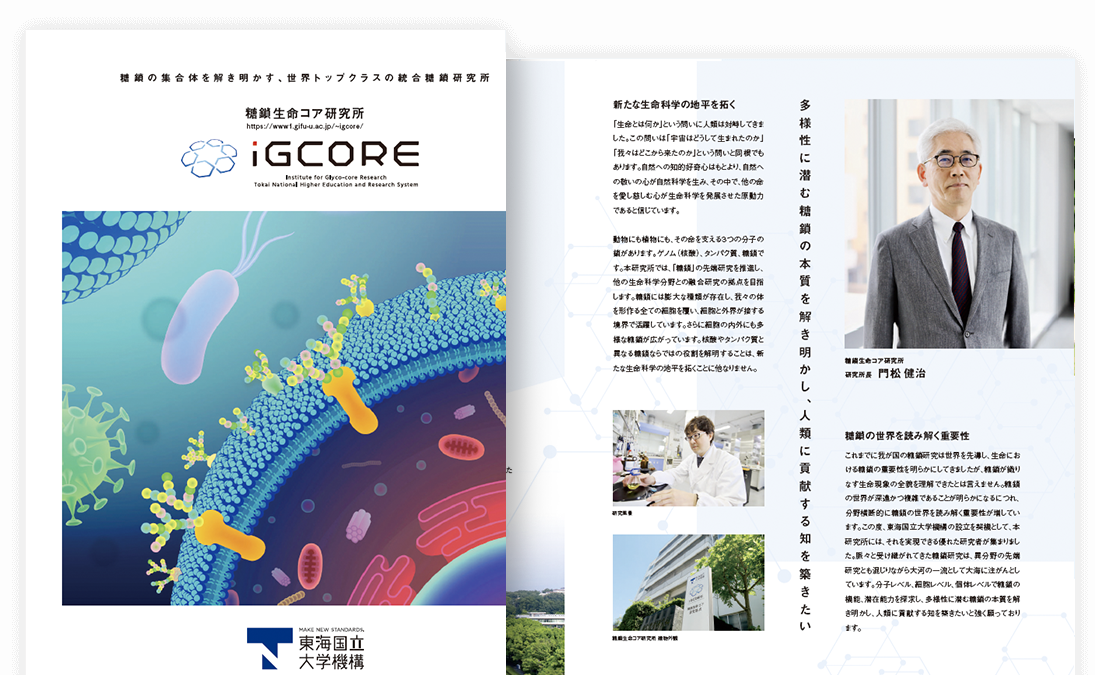RESEARCH
Glycan Regulation in Organism Division
Purpose / Contents

Understanding the roles of glycan assemblies in living organisms
The research purpose of the Bioregulation of Cell and Organism Division in the Integrated Glyco-BioMedical Research Center (iGMED) is to elucidate the functions of glycan assemblies in living organisms, focusing on specific physiological phenomena or diseases. In particular, the division focuses on several physiological events, including neural functions, development, regeneration, and aging, as well as diseases such as cancer, infectious diseases, and neurological disorders.
This division focuses their research on glycan-remodeled animals and disease model animals. By integrating the principles of single glycan molecules and glycan assemblies derived from the other divisions, we can expand our knowledge of how glycans are involved in complex biological and pathological processes. Clarification of the principles of glycans in diseases will lead to the development of novel diagnoses and therapies for diseases associated with glycans.
Examples

Glycan regulates axon regeneration
Our research interests include investigating the roles of glycans in the nervous and vascular systems of the body. Specific glycans, such as proteoglycans and polysialic acid, play crucial roles in neural functions. We have revealed that proteoglycans critically regulate axon regeneration.
(Sakamoto et al., Nat. Chem. Biol., 2019, 15, 699-709).

Draft of all tissue glycome in zebrafish
To understand the basis of glycan assembly in animal tissues, we have collaborated with the University of Lille in France to report a draft of the entire tissue glycome in zebrafish.
(Yamakawa et al., Nat. Commun., 2018, 9, 4647).
Members List
Kenji Kadomatsu
DirectorBioregulation of Cell and Organism Division
- Research interests
- Glycan, synapse, axon, neuroblastoma, renal disease
- Research subject
- We aim to elucidate the mechanisms by which glycans regulate physiological functions in the nervous system, especially synaptogenesis and axon elongation. We also study a wide range of molecular pathology, including neuroblastoma, a pediatric solid tumor, and metabolic diseases such as renal diseases.
Ken Kitajima
Division headBioregulation of Cell and Organism Division
- Research interests
- Integrated glycobiology, glycan metabolism, glyco-developmental biology, defective sialic acid metabolism and disease, evolution of sialic acid metabolism
- Research subject
- Disruption of genes for glycan metabolism often does not affect cell survival, whereas that causes various pathological conditions and death at the organism level. To understand glycan-related biological phenomena at the molecular level, we need to take an integrated glycobiology approach encompassing molecules, cells, and organisms. We particularly focus on sialic acid metabolisms. Using reverse genetics in medaka fish, we modify genes for sialic acid metabolism to alter domain functions, complex formation, and subcellular localization. We observe the individual phenotypes, as well as conduct integrated omics analysis involving genes, proteins, and glycans.
Masashi Ikeda
Bioregulation of Cell and Organism Division
- Research interests
- Psychiatric Disorders, Genomic Analysis, Pharmacogenomics
- Research subject
- We are conducting research to identify disease susceptibility genes, which can be a stepping stone for the identification of the mechanisms of psychiatric disorders.
In particular, we aim to take an approach that utilizes the results of genomic research for clinical interpretation by conducting analyses that take into account polygenic structures.
In addition, we will promote pharmacogenomic research aimed at identifying genes related to drug reactivity and side effects, and aim to implement genomic medicine.
Masahisa Katsuno
Bioregulation of Cell and Organism Division
- Research interests
- Motor neuron disease, Parkinson’s disease, dementia with Lewy bodies, oligonucleotide therapy, protein aggregation
- Research subject
- We focus on the pathogenesis and treatment of motor neuron diseases and Lewy body diseases (Parkinson's disease and dementia with Lewy bodies). For the pathogenesis, we mainly use mouse models and patient samples to elucidate the molecular pathogenesis at very early stages of the disease by omics and neuronal circuit analysis. For treatment, we administer small compounds and nucleic acid drugs to animal models and analyze the efficacy. For Lewy body diseases, we conduct a cohort study of high-risk individuals before the onset of the disease, and conduct a prospective longitudinal analysis of neurofunctional assessment, imaging, and blood biomarkers.
Yutaka Kondo
Bioregulation of Cell and Organism Division
- Research interests
- Epigenetics, non-coding RNA, cancer
- Research subject
- The interactions among proteins, DNA, and RNA in the cell nucleus cannot be explained simply by random molecular diffusion, and some regulatory mechanism probably promotes the interactions efficiently and specifically. We study the mechanism by which RNA and epigenome-related proteins are regulated by chemical modifications, including glycosylation, in cancer cells and contribute to carcinogenesis.
Hiroshi I. Suzuki
Bioregulation of Cell and Organism Division
- Research interests
- Cancer, genome, RNA, glycan, data science
- Research subject
- Various glycosylation abnormalities have long been known in cancer. By integrating large-scale data sets of genomic aberrations, RNA expression, and CRISPR-based essential gene screening in cancer, we build a platform to analyze the differences in mechanisms of glycan regulation between normal and cancer cells, and the relationship between cancer and glycans.
Masahiko Hibi
Bioregulation of Cell and Organism Division
- Research interests
- Zebrafish, medaka, genome editing, neurogenesis, neural function
- Research subject
- Using small fish such as zebrafish and medaka, we analyze the functions of genes involved in neurogenesis and also analyze neural circuits involved in higher order neuronal activity, through genome editing and generation of transgenic fish.
Koji Yamanaka
Bioregulation of Cell and Organism Division
- Research interests
- Neurodegeneration, dementia, glia, organelle, quality control of protein
- Research subject
- We generate animal and cellular models and aim to elucidate the pathology of neurodegenerative diseases and dementia and to develop therapy. In particular, we conduct research to elucidate pathology from the viewpoints of neuron-glia linkage, organelle linkage (mitochondria and endoplasmic reticulum), and abnormalities in protein and RNA metabolism.
Norio Ozaki
Bioregulation of Cell and Organism Division
- Research interests
- Mental disease, genome, model mouse, iPS cell, postmortem brain
- Research subject
- We investigate the pathogenesis of mental disorders by identifying genomic variants that are strongly associated with the onset of mental disorders. Specifically, we investigate molecular and neural circuit pathologies using iPS cells and postmortem brains derived from patients with genomic variants associated with the onset of mental disorders, and mouse models mimicking the genomic variants. We focus on variants of glycan-related genes and the involvement of glycans in neural development and neural circuit formation, aiming to elucidate the pathophysiology of mental disorders and develop diagnostic and therapeutic methods based on the pathophysiology of mental disorders.
Yoichiro Harada
Bioregulation of Cell and Organism Division
- Research interests
- Cancer, Diseases, Microenvironment, low glucose, metabolism, monosaccharides, glycans
- Research subject
- We aim to develop innovative seeds for drug discovery by elucidating the mechanisms by which living organisms use sugars and sugar chains to control biological phenomena and the mechanisms of diseases caused by the failure of these mechanisms.
Fumitaka Osakada
Bioregulation of Cell and Organism Division
- Research interests
- Brain, neural circuit, vision, pharmacology, viral vector, imaging, ES/iPS cell, organoid
- Research subject
- Many animals, including humans, recognize the external world based on sensory input and select appropriate actions. How is such functionality achieved by information processing in the brain and how is that processing impaired in neurological and psychiatric diseases? Our goal is to elucidate these questions in order to develop new treatments for neurological and psychiatric disorders. We conduct multidisciplinary research combining physiology, anatomy, and pharmacology with molecular biology, developmental biology, virology, behavioral psychology, optics, and informatics.
Di Wu
Bioregulation of Cell and Organism Division
- Research interests
- CMP-sialic acid synthetase, sialylation, medaka
- Research subject
- My research targets on the CMP-sialic acid synthetase (CSS), which is prerequisite for the expression of sialic acid (Sia)-containing glycoproteins and glycolipids, because CSS only provides all kinds of sialyltransferases with a donor substrate CMP-Sia. My final goal is to understand the biological significance of CSS at the organism level. For this purpose, medaka (Oryzias latipes) fish was chosen as a vertebrate model, various mutant medaka with a single amino acid substitution in CSS and specific CSS-domain knock-out medaka were established. To understand how CSS regulates sialylation through specific amino acids and domains at the organism level, morphological changes and sialylation changes in these CSS mutant medaka strains are studied by biochemical, histological and glycomic analyses. In addition, to reveal whole glycomes of medaka, sialomic analysis as well as total glycomic analysis are performed using the fluorometric HPLC and MS technologies.
Kazuya Izumi
Bioregulation of Cell and Organism Division
- Research interests
- Cancer, Inflammation, Metabolism, Cell biology, Glycans
- Research subject
- We aim to develop develop innovative therapeutic modalities targeting glycans and glycometabolism by elucidating biological functions regulated by sugars and glycans.
Research Division
Contact us by phone

052-789-5365
( +81-52-789-5365 )
Weekday, 9:00-17:00
Contact us




